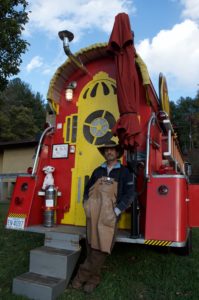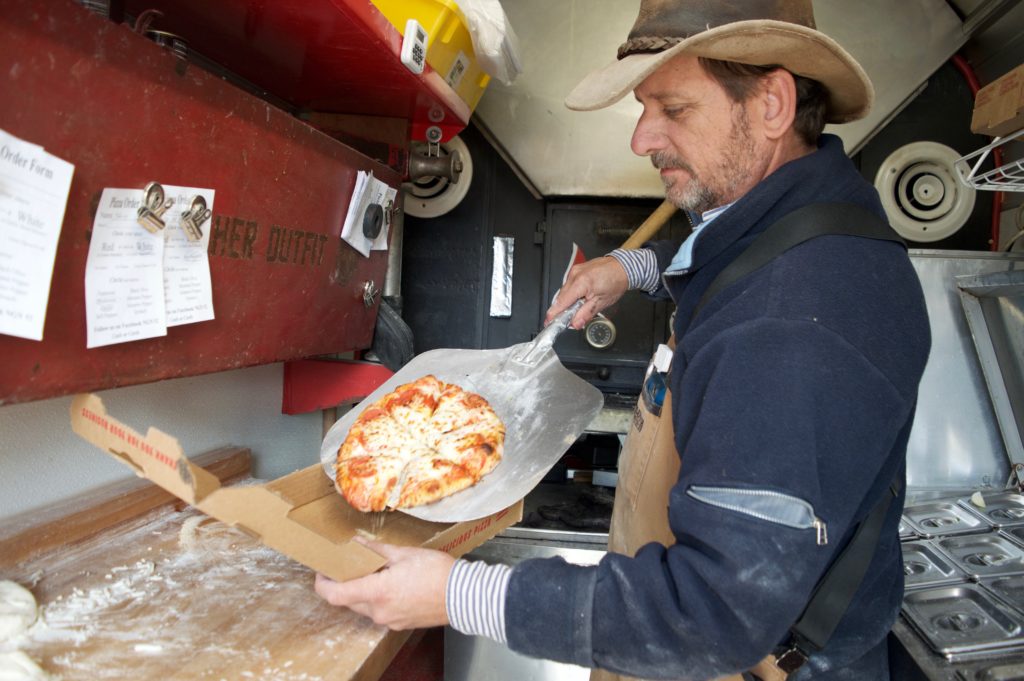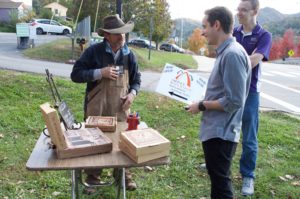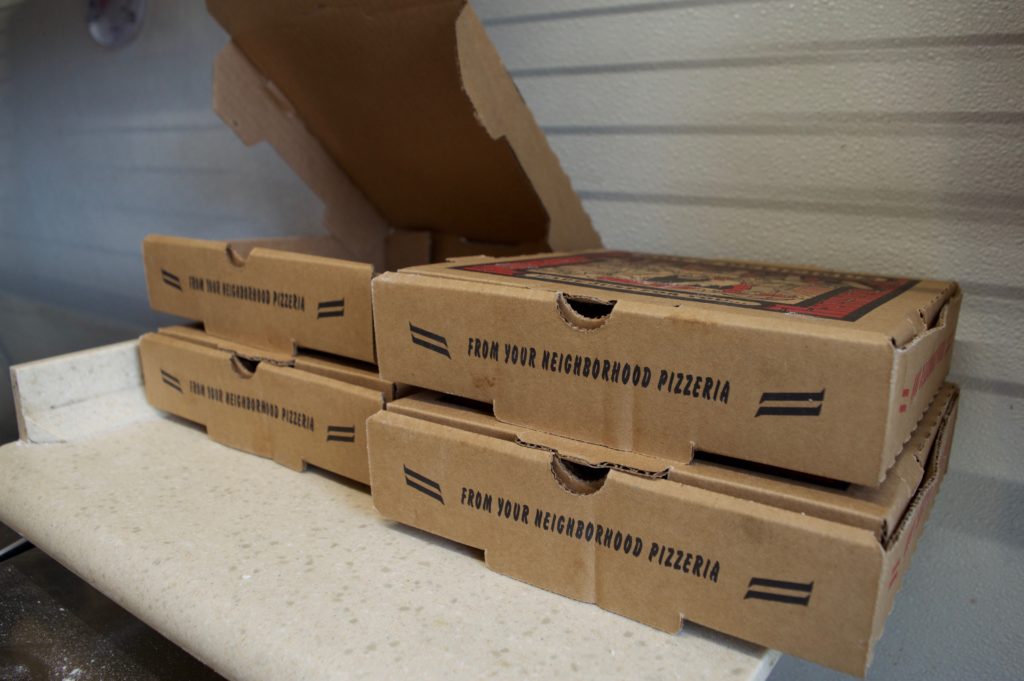
J.R. VanLienden NGN52 food truck is a way to make it big. Photo by Peta Petidis.
Breaking into the food industry with a small business is a feat met with both emotional and monetary costs. We all know that it’s time consuming, rigorous and overwhelming. According to the US Small Business Association, only 20 percent of businesses will survive their first year while more than 50 percent succumb to defeat after five years.
For many who are confronted with the shortcomings of small business, its failure and tumultuous endings are all consuming, stopping a hopeful entrepreneur in their tracks and dashing any hope to reach profitable success. Despite the restrictive climate for opportunity here in Cullowhee, the value of having small businesses on campus is more beneficial than you may expect.
J.R. VanLienden is one of few who still chases the American Dream in a world of corporate monopoly. Despite Jackson and Swaine County districts representing some of the poorest North Carolinian populations, VanLienden persists with his goal of making an impact on the local spectrum whilst staying afloat in a world of economic inconsistency. He is a man who commits to the reward of gifting his clientele with what he says is plenty of, “entertainment” and “amusement,” rather than just fixating on the desire of profit.

J.R. VanLienden has perfected the art of a gooey cheese pizza. Photo by Peta Petidis.
With inspiration from Walt Disney’s customer service achievements, VanLienden wants to enrich those he serves with the ultimate customer-worker relationship. The most basic formula of successful business, customer satisfaction, is what our WCU community may not be awfully familiar with, it’s something that small business can teach us.
VanLienden’s latest business venture – a food truck – is considered his “emergency vehicle.” With money being a concern for most households, VanLienden’s NGN52 food truck is a project he’s constructed in an effort to eventually climb his way into big business. While he’s faced a plethora of shortcomings with a catalogue of 7 to 9 failed businesses, VanLienden persists through the dichotomy of it all, claiming the world of small business to be, “fulfilling and frustrating.”
The 1950s model of a Maryland volunteer firetruck makes up the bones of VanLienden’s product, wood fired pizza. Almost entirely on his own, VanLienden endured months of drafting, building and rigorous health and safety check ups to transform his antique firetruck into a functioning food truck. The dome shaped oven is situated in the back of the truck, and the inner trailer decorated with restored shelves and tabletops made from materials remaining from the truck’s past life. The overall character of the truck is reflective of VanLienden’s. Cut out metal shapes on the floor of the kitchen space are designed to resemble flames of fire. While they pay homage to the truck’s history, its also reflective of VanLienden’s spark for success.
Along with providing a product, VanLienden serves social value. He educates in the field of small business and adds versatility to the food climate on our college premises.
What is it truly like to serve with a smile? How do you create excitement for your product and service? From Florida to North Carolina; a day care facility, a photography school and motor rides for kids – VanLienden never stops trying to achieve the perfect service. His wife, Darcy, considers him a diligent and thorough businessman who just wants to get it right in every aspect, saying that “he definitely goes out and dives into whatever he’s doing…he just keeps trucking, keeps moving.”

J.R. VanLienden greets his clientele with a brief history of his ‘financial vehicle.’ Photo by Peta Petidis.
As a veteran of small business who has experienced the hardships of the recession in an industry that is threatened by the latest technological advancements, VanLienden strives to amuse and entertain his community, no matter what. With his plethora of work experience, VanLienden understands the value of true customer service. With his Disney past, he’s even adopted a fascination with amusement parks, basing several past business models and upcoming projects on the idea of amusement — a recipe for the ultimate consumer experience.
He believes there’s a value in what he’s been taught and what he continues to chase with his businesses, that, “it should be an experience, to not only have a product or a service, but to also have a sense of enjoyment,” says VanLienden enthusiastically. Students who have encountered VanLienden’s food truck on Wednesdays and Fridays on the lawn outside Hillside Grind find pleasure in the quality of the pizza as well as VanLienden’s friendly approach. Salem Albabakri, a regular visitor of the food truck, considers the experience of small business on campus to be very rewarding.
“He presents himself like a local, so friendly and approachable, he does a good job with an interesting concept,” says Albabakri.
Daisy Lee, another Western Carolina student, believes that small business is a more reflective experience of the outside world than the food services available on campus.
“Food from small businesses always has more heart. These workers really want to see you happy. Student workers on campus are bored and slow,” she says.
With majority of food services on campus being run by Aramark, a hospitality industry giant, many students consider the food and service at these venues to be underwhelming. Aramark’s head of marketing, Kristin Fritts assures that students trained in Aramark facilities are taught to follow a customer service model called WEST which stands for, Welcome Engage Smile and Thank. This model is there to enrich students with the company’s workplace culture.
“We dream. We do. That is the Aramark way. Along with flexibility, work-life balance and fun!” explained Fritts in an email.
Their services have produced countless jobs on campus which aim to provide ongoing opportunities in food and customer service, however students currently employed by Aramark beg to differ. According to two employees who wish to remain anonymous, these services have lost the foundations of a humble and enriching business model. One Aramark employee has vouched that, “they don’t do enough for students,” despite their value of work-life balance. Another employee says, “ I have heard countless horror stories about the company and have witnessed first hand the lack of attention and care they not only provide to their employees, but to their facilities and food quality as well.”

Stack of pizzas for some happy customers. Photo by Peta Petidis.
Recently, a WCU student has debuted his own food truck business selling tacos in the Treehouse Apartment parking precinct. Not only is VanLienden excited to welcome another hopeful businessman into the Cullowhee food truck community, he’s also touched to know that the student entrepreneur has attributed his business model on that of VanLienden’s.
“He used to come talk to me about the truck and the business, now he’s doing it for himself,” says VanLienden with a proud smile.
Although our small campus is cloaked by the familiarity of a fixed food service, it pays off to venture a little further on the hillside whether it be for pizza, mentoring or even just a chat.


